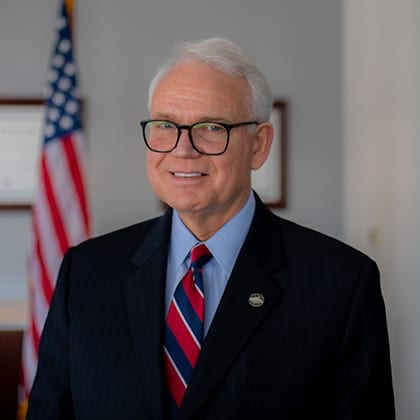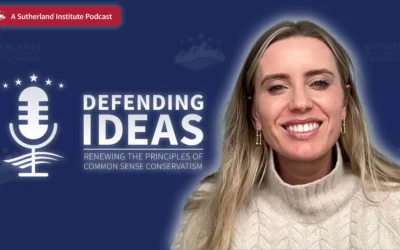
Written by Rick B. Larsen
February 7, 2019
In February 2019, we observe Black History Month with troubling images that are in the rearview mirror – but not nearly far enough behind us.
Hate crimes in the nation’s 10 largest cities increased by 12 percent last year, reaching the highest level in more than a decade. “Crimes motivated by race or ethnicity bias are consistently the most common type of reported hate crime, and African Americans are the most targeted group,” according to The Washington Post.
When will we as a people come to realize that hate does not resolve hate?
My friend Arthur Brooks offers a most compelling alternative. He recently asked, “Imagine running into an old friend you haven’t seen in years. As you catch up on one another’s lives, your friend asks, ‘So how is your marriage?’”
Of all the possible responses, you reply, “We’re civil.” Or worse still, “we tolerate each other.”
What you should say – and ideally mean – is, “I love my spouse. We are committed and happy. We respect and take care of one another.”
In a divided and angry nation, we talk more and more about civil dialogue and tolerance of political and racial differences. The problem with this is that it’s a secondary aspiration. We are avoiding the fact that the solution to the deep division in our communities, nation and government today is love.
For all who grew up in families of faith, we were raised on the concept love thy neighbor. Not “tolerate,” not “be civil to,” but love. That means seeing others as people of value, caring about their burdens.
The ability to hate a political opponent – or neighbor – can only exist based on contempt. Contempt goes beyond disagreement; it is dismissal. This is why political debates today speed right past conversation and go directly to personal attacks and insults. The working theory seems to be that a person who disagrees with you is not of a different mind; they are inferior or evil.
Psychology Today says contempt is difficult to define, but you know it when you feel it. And we have all felt it – perhaps even conveyed it. “Eye-rolling suggests contempt. An upper lip raised … a sarcastic tone of voice. … They are sure signs that someone is not listening or listening to deprecate you, not to gain understanding.”
We can agree that contempt is a recipe for disaster in our homes and families. So why do we foster it in our communities and in politics?
As a backwoods lawyer, Abraham Lincoln was known for quick wit and a theatrical flair that could hold an audience. History records a moment in young Lincoln’s life known as “the skinning of Thomas.”
“On certain occasions, Lincoln’s humor ran amok,” Doris Kearns Goodwin writes. Jesse Thomas, a Democrat, had what was described as “a little fun at Lincoln’s expense.” In response, Lincoln unleashed his considerable talents at “mimicry of gesture and voice, which gave way to scathing ridicule.” Lincoln parodied Thomas to the degree that Thomas, seated in the audience, broke down and cried. The “skinning of Thomas” became the stuff of local legend.
But Lincoln did not feel victory over an adversary in that moment. Rather, he was heartbroken. He sought out Thomas and offered an apology.
The memory of the incident distressed Lincoln for the rest of his life. Without sacrificing strength or intellect, he chose to never “give in to impulse” and behave that way again. Why? “Because he was after something more significant than the gratification of an artfully delivered humiliation.”
It is hard to say how we got to where we are today – or why we stay here. Some blame a president, others point to political parties and the media. While all of these things may contribute, blame solves nothing.
Treating others with love and respect is a choice. It is influenced by what we choose to listen to, read, watch and emulate. If we perceive in the coarseness of others a signal to behave in like manner (or adopt racist views, or embrace violent nationalism), the problem – and the solution – lies within each of us.
It is contradictory that in a nation of free and independent thinkers, we often abdicate our deepest character traits and behaviors to whoever shouts the loudest.
Martin Luther King Jr. saw this clearly when he taught, “Darkness cannot drive out darkness; only light can do that. Hate cannot drive out hate; only love can do that.” This month, may we reflect on this simple notion of love, and choose to pursue something more than just tolerance, civility, or the gratification of an artfully delivered humiliation.
More Insights
Read More
Why is Utah at odds with Justice Department over treatment of gender-dysphoric prisoner?
Lawsuit illustrates a little-known practice of federal agencies – giving various forms of “guidance” which are not supposed to be legally binding. The practice raises serious legal and constitutional questions.
What would a parent-teacher ‘handshake’ look like in Utah?
This partnership does not allow either party to pass blame entirely to the other. There is no scapegoat, only opportunities for either party or both to work on the factors within their scope.
Restoring “The Soul of Civility” in America, with Alexandra Hudson
Most people would agree that civility seems to be in short supply in our current political environment. But in recent years, a growing chorus of voices across the political spectrum has been calling for a return to principles of civility in politics, as well as all areas of public life.


